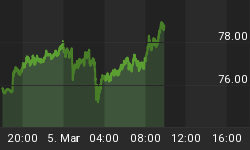Inquiring minds are listening to an interview with Marc Faber on Tech Ticker: The Next Thing You Need To Worry About Is The PIIGS
After every financial crisis there's a sovereign debt crisis, Marc Faber says. Countries that borrowed too much during the boom times start struggling to pay their competitors back, and eventually some of them default.
The countries most likely to blow up this time around are the "PIIGS": Portugal, Ireland, Italy, Greece, and Spain. One ore more of them, Faber says, will likely default in the next couple of years. And, that could result in the death of the Euro currency.
Longer-term, Faber says, Japan and the US are in line for the same fate.
Question Of Timeframe
Marc Faber says "The US crisis won't hit us this year or next year. But within 5-10 years, the United States will be forced to quietly default on its debt, most likely by printing money and destroying the value of the currency."
I like that timeframe. People expecting the US$ to implode right here right now are simply too early in my estimation. As for five years from now, I will reassess later. There are too many things happening right here right now to worry about 5-10 years from now.
Certainly the PIIGS are near the top of today's list of worries. Moreover, we can easily have a crisis in places eyes are not focused such as Mexico. Is anyone even looking at Mexico or what a housing crash might mean to Canada or Australia?
Let's not forget that Japan's rapidly aging demographics suggests that Japan crisis will hit before the US. Japan's debt is approaching 200% of GDP, Japan is mired in deflation, and its aging workforce now needs to draw down on savings, in retirement. The belief that "Japan is a nation of savers and the US is a nation of spenders" is about to be shattered. Secular spending trends in both countries have peaked, in opposite directions.
Finally, the love affair with China is way overdone. The amount of fiscal stimulus and monetary printing is off the charts. China is a bubble waiting to burst. I am in the camp, and have been for years, that if China floated the RMB it might crash, not soar.
By the way, if you have not yet read Faber's classic, Tomorrow's Gold, I suggest you do. No, it's not about "gold" as gold bugs think of it. It's about an approach to investing.
If you do not have a copy, pick one up.
Just remember: It's all too easy to focus on the long-term picture of the US$ while ignoring as critical, if not more critical issues elsewhere, right now.















